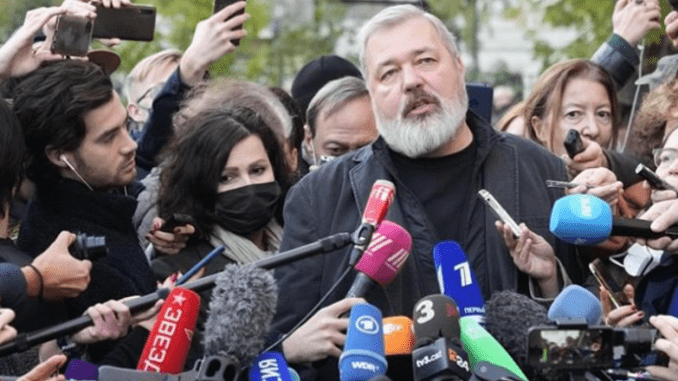
OSLO, Norway, October 10, 2021 (ENS) – The Norwegian Nobel Committee has awarded the Nobel Peace Prize for 2021 to Maria Ressa of the Philippines and Dmitry Muratov of Russia “for their efforts to safeguard freedom of expression, which is a precondition for democracy and lasting peace.”
At the same time, the Committee said, “They are representatives of all journalists who stand up for this ideal in a world in which democracy and freedom of the press face increasingly adverse conditions.”
For their courageous fight for freedom of expression in the Philippines and Russia, Ressa and Muratov will share equally in the 10 million Swedish kronor (US$1.14 million) the Peace Prize offers this year.
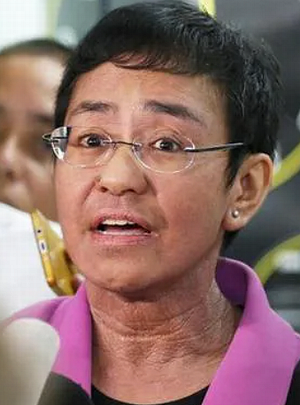
Ressa uses freedom of expression to expose abuse of power, use of violence and growing authoritarianism in her native country, the Philippines. In 2012, she co-founded Rappler, a digital media company for investigative journalism, which she still heads.
Rappler has focused critical attention on the regime of President Rodrigo Duterte and its controversial, murderous anti-drug campaign. “The number of deaths is so high that the campaign resembles a war waged against the country’s own population,” the Committee said.
Ressa and Rappler have documented how social media is being used to spread fake news, harass opponents and manipulate public discourse.
Dmitry Muratov has for decades defended freedom of speech in Russia under increasingly challenging conditions. In 1993, he was one of the founders of the independent newspaper “Novaja Gazeta.” Since 1995 he has been the newspaper’s editor-in-chief.
“Novaja Gazeta” is the most independent newspaper in Russia today, with fact-based journalism, professional integrity, and a fundamentally critical attitude towards power, the Committee said.
“Novaja Gazeta” has published critical articles on corruption, police violence, unlawful arrests, electoral fraud and “troll factories” and the use of Russian military forces both within and outside Russia.
Opponents of “Novaja Gazeta” have responded with harassment, threats, violence and murder. Since the newspaper’s start, six of its journalists have been killed, including Anna Politkovskaja who wrote revealing articles on the war in Chechnya.
Despite the killings and threats, editor-in-chief Muratov has refused to abandon the newspaper’s independent policy. He has defended the right of journalists to write anything they want about whatever they want, as long as they comply with the professional and ethical standards of journalism.
Free, independent and fact-based journalism serves to protect against abuse of power, lies and war propaganda. The Norwegian Nobel Committee is convinced that “freedom of expression and freedom of information help to ensure an informed public. These rights are crucial prerequisites for democracy and protect against war and conflict.”
Ressa was found guilty last year of libel and sentenced to jail. In August, a Philippine court dismissed the case. Ressa said she hopes the Nobel Peace prize will help investigative journalism “that will hold power to account.”
Muratov is the first Russian to win the Nobel Peace prize since Soviet leader Mikhail Gorbachev in 1990. Gorbachev used some of his prize money to help what would become “Novaya Gazeta” newspaper.
Nobel’s Fortune, Built on Weaponry, Funds Peace Prize
“Without freedom of expression and freedom of the press, it will be difficult to successfully promote fraternity between nations, disarmament and a better world order to succeed in our time. This year’s award of the Nobel Peace Prize is therefore firmly anchored in the provisions of Alfred Nobel’s will,” the Committee said.
Alfred Nobel was born in Sweden in 1833, grew up in Russia, studied chemistry and technology in France and the United States. He made his fortune in explosives, armaments, military weapons and equipment, particularly dynamite, which he patented in 1867.
Nobel’s will, signed in November 1895, specifies that each year a portion of the interest accruing to a special fund established by liquidating his companies be awarded as a prize to the person “who has done the most or best to advance fellowship among nations, the abolition or reduction of standing armies, and the establishment and promotion of peace congresses.” These words became the directive for the Nobel Peace Prize.
The other five Nobel Prizes from this fund are awarded to outstanding persons in medicine, literature, physics, chemistry, and economic science.
Physicist Laureates Discovered CO2‘s Effect on Climate
This year’s Nobel Prize in Physics is awarded jointly to Japanese-born Syukuro Manabe, a senior meteorologist at Princeton University in the United States, and Klaus Hasselmann of the Max Planck Institute for Meteorology in Hamburg, Germany. They will share half the 10 million kronor prize. The other half goes to Giorgio Parisi of Italy’s Sapienza University.
“They have laid the foundation of our knowledge of the Earth’s climate and how humanity influences it, as well as revolutionized the theory of disordered materials and random processes,” the Nobel Committee said.
Complex systems are characterized by randomness and disorder and are difficult to understand. This year’s prize recognizes new methods for describing them and predicting their long-term behavior, the Committee said. One such complex system of vital importance to humankind is Earth’s climate.
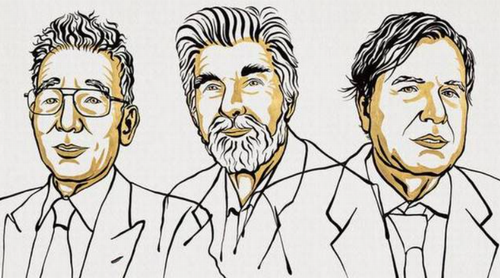
“The discoveries being recognized this year demonstrate that our knowledge about the climate rests on a solid scientific foundation, based on a rigorous analysis of observations. This year’s Laureates have all contributed to us gaining deeper insight into the properties and evolution of complex physical systems,” Thors Hans Hansson, chair of the Nobel Committee for Physics, said.
Manabe demonstrated how increased levels of carbon dioxide in the atmosphere lead to increased temperatures at the surface of the Earth. His work laid the foundation for the development of current climate models.
Ten years later, Hasselmann created a model that links weather and climate, answering the question of why climate models can be reliable despite weather being changeable. He also developed methods for identifying specific signals, fingerprints, that both natural phenomena and human activities imprint on the climate.
His methods have been used to prove that the increased temperature in the atmosphere is due to human emissions of carbon dioxide.
Around 1980, Parisi discovered hidden patterns in disordered complex materials. His discoveries make it possible to understand and describe many different and apparently entirely random materials and phenomena, not only in physics but also in other, different areas, such as mathematics, biology, neuroscience and machine learning, the Committee said.
The world meteorological community and the international science community have welcomed the awarding of the 2021 Nobel Prize in Physics to these “pioneering climate scientists who laid the foundations for understanding the role of human activities and greenhouse gases in climate change,” said the World Meteorological Organization, WMO.
The award is especially timely as it comes on the eve of a decisive UN Climate summit, COP26, which opens November 1 in Glasgow, Scotland.
WMO Secretary-General Professor Petteri Taalas said, “This demonstrates that climate science is highly valued and the climate science message has been heard.”
He stressed the urgency of translating the scientific knowledge into policy-making. “The concrete action hasn’t been ambitious enough so far,” said Taalas. “There’s clearly a need to raise the ambition level. We cannot wait for decades to start acting,” he warned.
“As public awareness of climate change grows, it is encouraging to see the Nobel Physics Prize recognizing the work of scientists who have contributed so much to our understanding of climate change, including two IPCC authors – Syukuro Manabe and Klaus Hasselmann,” said Dr. Hoesung Lee, who chairs the Intergovernmental Panel on Climate Change.
2021 Laureates Make Chemistry ‘Greener‘
The Royal Swedish Academy of Sciences has awarded the Nobel Prize in Chemistry 2021 jointly to Benjamin List of the Max-Planck-Institut für Kohlenforschung, Mülheim an der Ruhr, Germany and David W.C. MacMillan of Princeton University for the development of “asymmetric organocatalysis.”
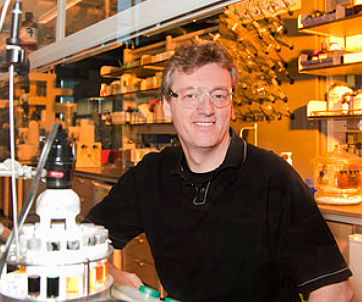
What List and MacMillan did, each working independent of the other, was develop a precise new tool for molecular construction: organocatalysis. “This has had a great impact on pharmaceutical research, and has made chemistry greener,” the Royal Swedish Academy said.
Catalysts are fundamental tools for chemists. These substances control and accelerate chemical reactions, without becoming part of the final product. For instance, catalysts in cars transform toxic substances in exhaust fumes to harmless molecules.
Researchers had long believed that there were just two types of catalysts available: metals and enzymes. But in 2000, List and MacMillan developed a third type of catalysis. Called asymmetric organocatalysis, it builds upon small organic molecules.
“This concept for catalysis is as simple as it is ingenious, and the fact is that many people have wondered why we didn’t think of it earlier,” says Johan Åqvist, who chairs the Nobel Committee for Chemistry.
Organic catalysts have a stable framework of carbon atoms, to which more active chemical groups such as oxygen, nitrogen, sulfur or phosphorus can attach. These catalysts are both environmentally friendly and cheap to produce.
The rapid expansion in the use of organic catalysts is primarily due to their ability to drive asymmetric catalysis. Using these reactions, researchers can now more efficiently construct anything from new pharmaceuticals to molecules that can capture light in solar cells.
Medicine: Discovering How We Sense the Environment
The Nobel Assembly at Karolinska Institutet has awarded the 2021 Nobel Prize in Physiology or Medicine jointly to David Julius and Ardem Patapoutian for their discoveries of receptors for temperature and touch. The Assembly said, “The laureates identified critical missing links in our understanding of the complex interplay between our senses and the environment.”
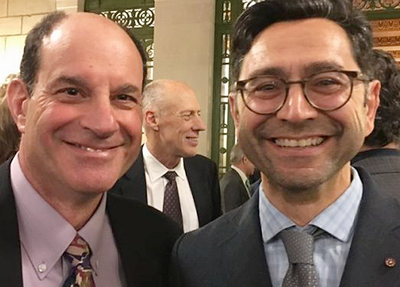
David Julius used capsaicin, a pungent compound from chili peppers that induces a burning sensation, to identify a sensor in the nerve endings of the skin that responds to heat.
Born in New York City, Julius earned a PhD in 1984 from University of California, Berkeley and was a postdoctoral fellow at Columbia University before he was recruited to the University of California, San Francisco in 1989 where he is now a professor and chair of the Department of Physiology and also holds the Morris Herzstein Chair in Molecular Biology and Medicine.
Ardem Patapoutian used pressure-sensitive cells to discover a novel class of sensors that respond to mechanical stimuli in the skin and internal organs.
Born in Beirut, Lebanon, Patapoutian moved as a youth from a war-torn Beirut to Los Angeles. He earned a PhD from California Institute of Technology and was a postdoctoral fellow at the University of California, San Francisco. Since 2000, he has been a scientist at Scripps Research, La Jolla, California where he is now a professor. He has been a Howard Hughes Medical Institute Investigator since 2014.
These breakthrough discoveries launched intense research activities leading to a rapid increase in our understanding of how our nervous system senses heat, cold, and mechanical stimuli.
This knowledge is being used to develop treatments for a wide range of disease conditions, including chronic pain.
Literature Awardee Dramatizes the Lives of Refugees
The Nobel Prize in Literature for 2021 goes to the novelist Abdulrazak Gurnah, PhD “for his uncompromising and compassionate penetration of the effects of colonialism and the fate of the refugee in the gulf between cultures and continents.”
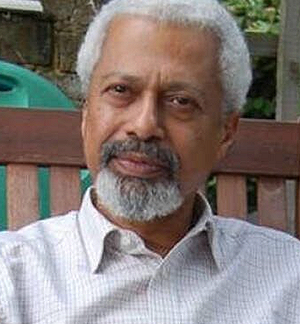
Gurnah is the first Black writer to receive the prize since 1993, and the first African writer since 2007.
His win was a total surprise to him, he told Adam Smith, chief scientific officer of Nobel Prize Outreach, who telephoned to tell Gurnah of his award.
“I was just thinking ‘I wonder who’ll get it,” said Gurnah. Of Smith’s call, he said, “I thought it was a prank, I really did.”
Gurnah was born and grew up on the island of Zanzibar in the Indian Ocean, which is now part of present-day Tanzania. He fled the Zanzibar Revolution and arrived in England as a refugee in 1968. He has published 10 novels and a number of short stories. The theme of the refugee’s disruption runs throughout his work.
Gurnah now holds the title of Emeritus Professor of English and Postcolonial Literatures at the University of Kent in England.
Consistent themes of exile, displacement and belonging, colonialism and broken promises by governments run throughout his works, many of which tell of the lives of East African people caught in conflict and social disruption who may not be able to tell their own stories to the world.
“A kind of miserliness,” is how Gurnah described to Smith the attitude of some in Europe to refugees. After all, he said, “Europeans streaming out into the world is nothing new.” He suggested that those seeking refuge be seen as “talented, energetic people, who have something to give.”
Featured image: Dmitry Muratov of Russia, the first Russian person to win a Nobel Peace Prize since Mikhail Gorbachov won in 1990, is surrounded by Russian media. will share the 2021 Nobel Peace Prize courageous journalism under authoritarian regimes. October 8, 2021 (Photo courtesy Okotoks Today)
© 2021, Environment News Service. All rights reserved. Content may be quoted only with proper attribution and a direct link to the original article. Full reproduction is prohibited.



